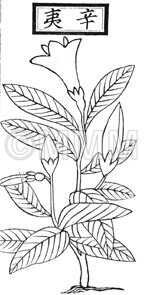Crude drug sample data base
※Click on the image to enlarge it.
The capital city, provincial capital city or the representative
location of its administrative area is indicated.
location of its administrative area is indicated.
34.746611
113.62532799999997
Production area information
People's Republic of China,Henan Prov.
https://ethmed.toyama-wakan.net/img/pin_san.png
34.6937378
135.50216509999996
Collection information
Japan,Osaka Pref.
https://ethmed.toyama-wakan.net/img/pin_nyu.png
Scientific information data base
| Common name | 辛夷, Xinyi, Magnoliae Flos (JP18, CP2020), Magnolia Flower (JP18), Biond Magnolia Flower (CP2020) | ||||
|---|---|---|---|---|---|
| crude drug image |
| ||||
| Original plant name | Magnolia biondii Pampanini, Magnolia heptapeta Dandy1 (Magnolia denudata Desrousseaux), Magnolia sprengeri Pampanini, Magnolia salicifolia Maximowicz2 or Magnolia kobus De Candolle3, (Hakumokuren1, Tamushiba2, Kobushi3) | ||||
| original plant image |
| ||||
| Family name | Magnoliaceae | ||||
| Used part | flower bud | ||||
| Quality for selection | Good Xinyi is fat, dense and has much moisture. (TN) | ||||
| Official compendium | JP XVIII, CP (2020 ed.) | ||||
| Clinical application | As tranquilizer and painkiller apply to rhinitis and empyema. | ||||
| Medical system | Traditional Chinese medicine | ||||
| Drug effect in traditional medicine | Traditional classification | Diaphoretics with warm property | |||
| Beneficial effect | [Property and Flavor] Warm; pungent. [Meridian Tropism] Lung and stomach meridians. [Actions] To disperse wind-cold, relieve the stuffy nose. [Indications] Wind-cold headache, nasal congestion, nasal discharge, allergic rhinitis, sinusitis. | ||||
| Chemical constituent | Monoterpenoids (*C1): 1,8-Cineol, alpha-Pinene, Citral M. salicifolia (九州産 / products of Kyusyu district, Japan) (*C1): Camphor, Limonene M. salicifolia (関東,奥羽中南部,奥羽西部,秋田,新潟地方産 / products of Kanto, West Ohshu, South-Central Ohshu, Akita, Niigata district, Japan) (*C1): Camphor Phenylpropanoids (*C1): Asarone, Euasarone, Asarylaldehyde, Methylchavicol, Eugenol M. salicifolia (関東,奥羽中南部産 / products of Kanto, South-Central Ohshu district, Japan) (*C1): Safrole M. salicifolia (奥羽西部,秋田,新潟地方産 / products of West Ohshu, Akita, Niigata district, Japan) (*C1): Methyleugenol Lignans & Neolignans (*C1): Magnosalin M. salicifolia (*C2,C3,C4): Magnosalin, Magnoshinin Alkaloids (*C1): d-Coclaurine, l-N-Methylcoclaurine, d-Reticuline, Yuzirine | ||||
| Chemical structure |
※画像をクリックすると、拡大して表示されます。 | ||||
| Pharmacological effect | antibacterial (pathogenic cutaneous Trichophyton). Antiallergy | ||||
| DNA sequence | AB021009, L12656; Traditioal Medical & Parmaceutical Database. | ||||
| Classical reference (Chinese Herbal Classic "Zhenglei bencao") |  ※Click this image to see the actual image ※Click this image to see the actual image | ||||
| Disease | Headache, Nasal obstruction, Pituita, Sinusitis | ||||
| Formulation | Kakkontokashin'isenkyuto, Shin'isan, Shin'iseihaito | ||||
| Related drugs | Magnolia Flower | ||||
| References | (JP18): The 18th edition of the Japanese Pharmacopoeia. (CP2020): Pharmacopoeia of the People's Republic of China 2020 edi. C1)The Encyclopedia of Wakan-Yaku with Color Pictures Vol. II, pp 125-127. C2)Chem.Pharm.Bull.,31,1112(1983). C3)Planta Med.,46,291(1985). C4)Tetrahedron Lett.,28,2857(1987). | ||||
| Remarks | Chinese Xinyi is the dried flos of Magnolia biondii Pamp. (Jap. Name: Mokuren), M. liliflora Desr. (Jap. Name: Hakumokuren) or M. denudata Desr. Most Xinyis imported to Japan originate from M. biondii. Japanese Xinyi is the dried flos of M. salicifolia (Jap. Name: Tamushiba). It is less puberulent and moisture. Therefore, the quality is inferior to Chinese one. Japanese Xinyi has been said to be M. kobus DC. (Jap. Name: Kobushi) in the past. However, it can not be found in the market now. | ||||
| Last renewal date | 2022/07/29 | ||||







